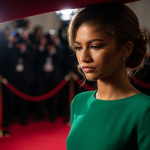5 Iranian Diplomats Who Unexpectedly Influenced Hollywood
When you think of high-stakes international relations, your mind probably jumps to tense negotiations and formal state dinners, not the glitz and glamour of Hollywood. Yet, the worlds of diplomacy and cinema have collided more often than you might imagine. In particular, a number of influential iranian diplomats have, over the decades, played fascinating and unexpected roles that directly impacted the entertainment industry. From forging friendships with movie stars to becoming the subjects of Oscar-winning films, these individuals prove that a diplomat’s influence can extend far beyond the embassy walls.
This surprising intersection highlights the power of “soft power,” where culture becomes a currency for international dialogue. Film, as one of the most powerful cultural exports, has often been a stage for these diplomatic maneuvers. Let’s explore five key figures who blurred the lines between politics and pictures.

The High-Society Ambassador and the Hollywood Queen
Long before the 1979 revolution, Iran’s relationship with the West was personified by one of its most charismatic representatives: Ardeshir Zahedi. Serving as the Iranian ambassador to the United States (and previously the United Kingdom), Zahedi was a staple of Washington D.C.’s high society, known for his lavish parties and A-list connections. His most famous friendship was with none other than Hollywood royalty, Elizabeth Taylor.
Their bond was genuine and well-documented. Zahedi was a constant presence in Taylor’s life, escorting her to film premieres, galas, and even the Academy Awards. This was more than just a friendship; it was a powerful act of public diplomacy. By associating Iran with a beloved global icon like Taylor, Zahedi crafted an image of his nation as sophisticated, modern, and friendly to the West. Their relationship was so prominent that it became a symbol of the close ties between the two nations during that era, a far cry from the strained relationship that would follow.
- Role: Ambassador to the U.S. & U.K.
- Hollywood Connection: Close friendship with Elizabeth Taylor.
- Impact: Used celebrity connections to project a positive, modern image of Iran in the West.
The Unexpected Film Critic: When Iranian Diplomats Reviewed ‘Argo’
Fast forward several decades, and the relationship between the U.S. and Iran had changed dramatically. This tension was famously captured in the 2012 Oscar-winning film Argo, directed by and starring Ben Affleck. The film depicted the daring rescue of American diplomats during the 1979 Iran hostage crisis. While a hit with audiences and critics, it sparked a significant reaction from the very people it portrayed.

Perhaps the most high-profile critic was Javad Zarif, who would later become Iran’s Foreign Minister. A seasoned diplomat, Zarif took to social media and interviews to offer his take on the film. He criticized Argo for its historical inaccuracies and for what he described as a one-dimensional portrayal of Iranians. This was a fascinating moment where a high-ranking diplomat engaged directly with a piece of popular entertainment, using it as a platform to present his country’s narrative to a global audience. His critique turned him into an unlikely film commentator and highlighted how cinema can become a battleground for international perception. The political climate surrounding such events remains complex, as detailed in reports from major news outlets like Reuters on U.S.-Iran relations.
From the UN to Cahiers du Cinéma: The Diplomat-Turned-Auteurist
One of the most direct and intellectual links between Iranian diplomacy and Hollywood can be found in the incredible life of Fereydoun Hoveyda. Brother of a former Iranian Prime Minister, Hoveyda served as Iran’s Ambassador to the United Nations for much of the 1970s. However, before and after his diplomatic career, he was a respected intellectual and film critic.
What makes Hoveyda’s story remarkable is his deep involvement with the French New Wave cinema movement. He was a writer and critic for the legendary film journal Cahiers du Cinéma, working alongside future directing giants like Jean-Luc Godard and François Truffaut. He was a key proponent of the “auteur theory,” the idea that a director is the primary author of a film.
Hoveyda’s unique career path is a testament to the deep cultural and intellectual currents that can flow through the world of diplomacy. He wasn’t just a political representative; he was an active participant in shaping 20th-century film theory. His work demonstrates that a passion for art and a career in international politics are not mutually exclusive pursuits.
Key achievements of Fereydoun Hoveyda:
- Served as Iran’s Ambassador to the United Nations.
- Contributed influential essays to the prestigious film magazine Cahiers du Cinéma.
- Authored several books on film history and theory.
- Championed the auteur theory alongside pioneers of the French New Wave.

The Modern Cultural Attaché and Festival Diplomacy
While specific names may be less famous than a Cold War-era ambassador, the role of the modern cultural attaché is vital. These unsung Iranian diplomats work behind the scenes to promote Iranian culture abroad, with a major focus on its world-renowned cinema. They are the ones facilitating the entry of Iranian films into prestigious festivals like Cannes, Berlin, and Venice.
Their work involves:
- Navigating complex international regulations.
- Building relationships with festival organizers.
- Arranging for directors and actors to attend screenings.
- Promoting films to international distributors.
Through their efforts, masterpieces from directors like Asghar Farhadi (A Separation, The Salesman) have gained global acclaim, winning Oscars and reshaping how the world sees Iranian society. These diplomats operate on the front lines of cultural exchange, using art to foster understanding and create dialogue where political avenues may be closed.
The Fictional Diplomat Who Sparked Real Debate
Sometimes, the most influential diplomat is one who never existed at all. Fictional portrayals of iranian diplomats in shows like Homeland or Madam Secretary have a powerful impact on public perception. These characters, often written as cunning, sophisticated, and complex, shape how millions of viewers understand the intricacies of U.S.-Iran relations.
While fictional, these portrayals often spark very real conversations among viewers, journalists, and even actual policymakers. They can reinforce stereotypes or, in some cases, challenge them by presenting a more nuanced character than audiences expect. The entertainment industry’s depiction of these figures becomes a form of “unofficial diplomacy,” creating a cultural narrative that real-life diplomats must then engage with, for better or worse. It’s a clear sign that in today’s interconnected world, the line between the primetime drama and the political reality is thinner than ever.















